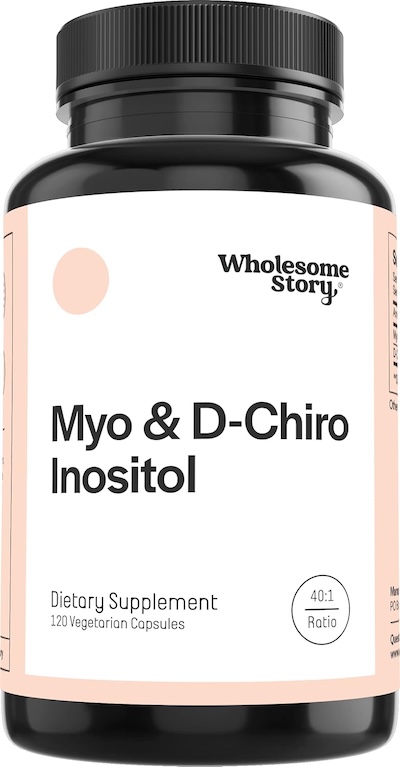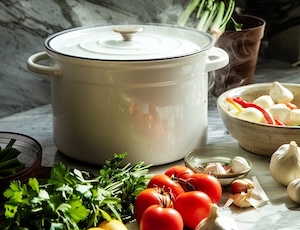PCOS Friendly Fermentation: Complete Guide to Probiotic Food Preparation
Discover how fermented foods can support hormone balance, reduce inflammation, and improve gut health for women with PCOS in this comprehensive fermentation guide.
This recipe includes superfoods such as:
Transform your health with tailored 7-day meal plans designed specifically for PCOS management. Just $7/month or $59/year.
Get it now →
Support your hormonal health with the ideal 40:1 ratio! This premium inositol supplement helps promote ovarian function and fertility. Vegan, gluten-free, and made in the USA. 30-day supply.
Get it on Amazon →6 Boneless, Skinless Chicken Thighs
1 Cup Peanuts (1/2 Cup Peanut Butter if you aren’t making your own)
1/4 Cup Chicken Stock
2 Tbsp. Soy Sauce
1 Tbsp. Orange Juice
1 Tbsp. Lemon Juice
1 Tbsp. Rice Vinegar
1/2 Tbsp. Coconut Oil
1/2 Tbsp. Erythritol
1/2 tsp. Sesame Oil
2 tsp. Chili Garlic Paste
1/4 tsp. Coriander
1/4 tsp. Cayenne Pepper
Salt Pepper to taste
1. Rinse your peanut off in the bowl of your salad spinner.
2. Spin the salad spinner and then pat the nuts dry with paper towels.
3. Add your peanut to your food processor.
4. Blend the nuts until they are powdery, scrape the sides and then continue blending.
5. Once the nuts turn a little bit creamy, add 1/2 Tbsp. erythritol and 1/2 Tbsp. coconut oil.
6. Continue blending until a smooth and creamy consistency happens.
7. In a bowl, combine your peanut butter, 1/4 Cup Chicken Stock, 2 Tbsp. Soy Sauce, 1 Tbsp. Orange Juice, 1 Tbsp. Lemon Juice, 1 Tbsp. Rice Vinegar, 1/2 tsp. Sesame Oil, 2 tsp. Chili Garlic Paste, 1/4 tsp. Coriander.
8. Mix the ingredients well until a thick and creamy sauce is achieved.
9. Cube all of your chicken thighs, cutting off the extra grit as needed.
10. Season your chicken thighs well with salt and pepper, to taste.
11. In a pan, bring 1 Tbsp. Olive Oil to its smoking point – I use the highest heat my stove can go.
12. Once the smoking point is achieved, add your chicken and start cooking it fast.
13. As the chicken cooks, moisture is released. You don’t want boiled chicken, so make sure you pat out the extra moisture with a paper towel. This means that the oil will be removed with the juices.
14. Continue cooking until the chicken is browned on both sides. Trying to not touch the chicken too much here is key.
15. Once the chicken is cooked, add your peanut sauce.
16. Turn your pan to low and let this simmer for 10 minutes.
17. Serve with slices cucumber, red pepper flakes, and extra chili paste.

The 10/10 PCOS Solution is your answer: Ten hormone-balancing crockpot recipes that each take just 10 minutes to prep!
While your slow cooker works its magic, you can focus on self-care, family time, or simply rest knowing your PCOS-friendly meal is practically making itself.
These recipes are specifically designed to:
→ Click here to reclaim your time while nourishing your body with The 10/10 PCOS Solution

Transform your health with tailored 7-day meal plans designed specifically for PCOS management. Just $7/month or $59/year.
Get it now →Serving Size: 3
| Amount Per ONE Serving | ||
|---|---|---|
| Calories 1487 kcal | ||
| Fat 107 g | ||
| Carbohydrate 26.5 g | ||
| Protein 141 g | ||
💡 Introducing the 10/10 PCOS Solution:
Ten Delicious Crockpot Recipes that take just 10 minutes to prep!
Say goodbye to hours in the kitchen and hello to clean, PCOS-friendly meals made effortlessly.
👉 Click here to grab your 10/10 PCOS Solution today! Try The 10/10 PCOS Solution: Ten Crockpot Recipes That Take Just Ten Minutes to Prep
Managing PCOS can be challenging, but you don't have to do it alone. Join our supportive community to connect with others who understand what you're going through, share tips, and get encouragement. Here's how you can get involved:
Subscribe to our Newsletter: Receive PCOS-friendly recipes, tips, research updates, and more delivered straight to your inbox. Stay informed and empowered with the latest information and support.
Join our Telegram Channel: Stay updated with the latest tips and advice on managing PCOS.
Follow PCOS Meal Planner on Facebook: Engage with our community, participate in discussions, and get support from others.
Break the cycle with the PCOS Meal Planner - your personalized guide to eating better, feeling better, and managing PCOS symptoms. Take control today!

Forget the frustrating cycle of weight loss attempts, endless medications, and living in discomfort. Introducing the PCOS Meal Planner. A meal planning guide that goes beyond temporary fixes to offer a comprehensive strategy, empowering you to ignite a transformation towards lasting health and happiness. Step into a world where you control your PCOS, not the other way around.
Unlock Your PCOS Freedom Now.
Discover how fermented foods can support hormone balance, reduce inflammation, and improve gut health for women with PCOS in this comprehensive fermentation guide.
Discover healing PCOS friendly soups with anti-inflammatory ingredients that balance hormones, stabilize insulin, and support gut health for symptom relief.
Discover hormone-balancing travel meals and insulin-friendly flight snacks in our complete PCOS friendly airplane food guide for stress-free travel.
Discover delicious PCOS friendly mocktails that balance hormones while celebrating. Learn how to create festive drinks without disrupting insulin.
Discover PCOS friendly microwave meals that balance hormones and blood sugar while saving time. Quick, nutritious options for busy women managing PCOS symptoms.
Confused between PCOS and PMDD? Learn to distinguish these hormonal conditions, their unique mood symptoms, and effective management strategies.
Discover effective PCOS friendly detox drinks that support liver health, balance hormones, and reduce inflammation without spiking insulin levels.
Explore the benefits and drawbacks of natural vs conventional PCOS treatment options to make informed decisions about managing your PCOS symptoms effectively.
Learn how to distinguish between PCOS and PMDD symptoms and find effective management strategies for both hormonal conditions.